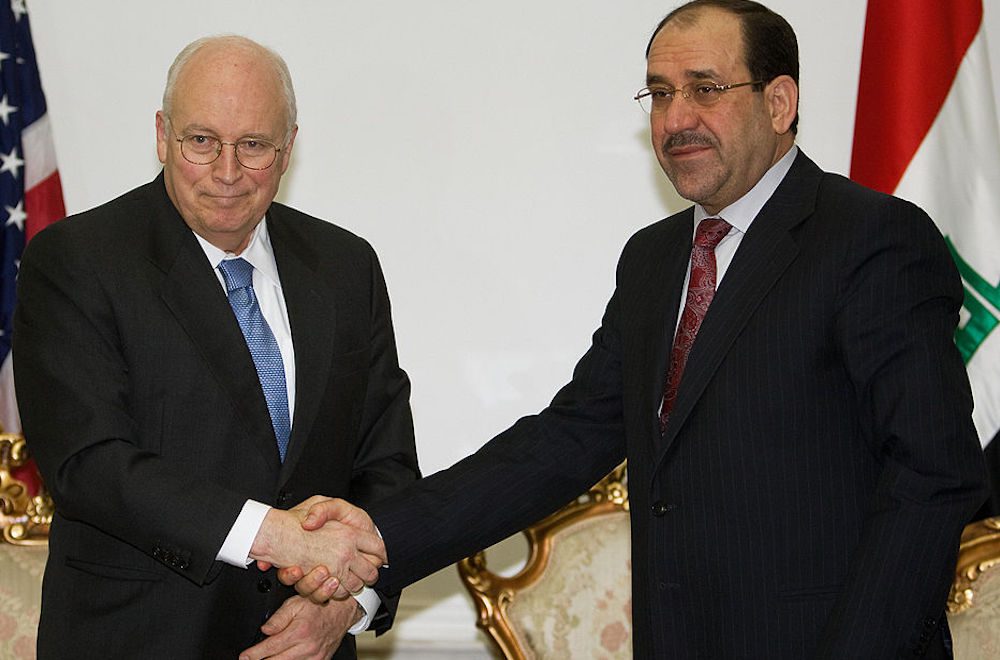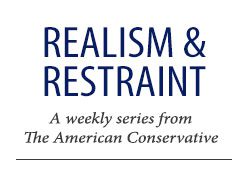How the U.S. Facilitated a Quiet Iranian Invasion of Iraq

The investigative publishing entity The Intercept landed a big scoop recently when an anonymous Iraqi source dropped on its doorstep a cache of internal security documents—some 700 pages—produced by Iranian officials involved in operations in Iraq. The Intercept shared the documents with The New York Times, and the two organizations published them simultaneously on Monday after verifying their authenticity.
It’s a big story because the documents “offer a detailed portrait,” as the Intercept/Times piece puts it, “of just how aggressively Tehran has worked to embed itself into Iraqi affairs.” This became possible, the piece adds, after the ill-conceived and ill-fated U.S. invasion of Iraq in 2003, “which transformed Iraq into a gateway for Iranian power.” Indeed, the two news organizations say that the “notion that the Americans handed Iraq to Iran when they invaded now enjoys broad support, even within the United States military.”
The piece is remarkable in its revelations about how Iran operates in Iraq, how influential it has become in that country, and how it has “at nearly every turn…outmaneuvered the United States in the contest for influence.” But perhaps the revelations shouldn’t be considered all that remarkable at all, because what is described here was entirely inevitable and hence predictable. A bit of history reveals the extent of that inevitability.
Iraq is not a nation in any strict sense of the word and never has been. It was forged out of chaos by Great Britain at the end of World War I, during the height of the British Empire, arbitrarily pieced together from three Ottoman provinces—Mosul in the north, composed largely of Kurdish tribesmen; Baghdad in the center, dominated by the Sunni minority, protected and nurtured for centuries by the Ottoman overlords; and Basra in the south, populated mostly by the majority Shiites. As Sandra Mackey explains in her book The Reckoning: Iraq and the Legacy of Saddam Hussein, this jumble included a degree of urban sophistication between the two famous rivers and Bedouin tribalism in the countryside; Sunni religious doctrines in the central triangle and Shiite passions in the south; Arabs in the lowlands and Kurds in the mountains; and a vast array of other sects, tribes, and religions.
Mackey writes that the most powerful mystique in Iraq is the Bedouin culture, a product of extensive migrations from Arabia between the 17th and late 19th centuries that poured Arab tribes into the Tigris-Euphrates valley and stamped the region with their impulses and habits of mind. These tribes, she explains, “have fed much of the political disorder that has been a hallmark of the Iraqi state. The result is that nationalism, whether seen as good or bad, simply does not exist in the sense that an individual feels a strong primary loyalty to his country.”
All the rulers of Iraq in modern times, beginning with the kings who governed for nearly four decades from the early 1920s (when the British installed the monarchy) up to the military dictators thereafter, struggled to find a definition either in Arab nationalism or Iraqi nationalism, or as Mackey puts it, “Arabism or a contrived Iraqi nationalism built upon the history and symbols of ancient Mesopotamia.” Neither could work because Mesopotamia has little meaning to present-day Iraqis, and Arabism, while resonant with Sunnis, is rejected by non-Arabs and most Shiite Iraqis.
The result is that the same persistent hatreds that the British encountered during the 1920s continued to fester right up until the American occupation 80 years later. And the same distribution of power persisted also. The Bedouin tribes that immigrated there centuries ago, though eventually a majority, were cast as outsiders. At the beginning, the Sunni Ottomans, fearing the power of Shiite Persia to the east and the Shiite tribesmen in their own countryside, turned to the one element in society they could trust—the Sunnis of the cities between the Tigris and Euphrates. They relied on these cities to hold the desert Arabs in check. Thus, the old Sunni families held all the major administrative positions, staffed the bureaucracy, and dominated the Sunni religious ulama, the establishment of clerical wise men. It was a closed world, and it was perpetuated in turn, in the name of stability, by the Ottomans, then the British, then the kings installed by the British, and finally the dictators who upended the kings.
That was the system that President George W. Bush destroyed by invading Iraq and dislodging the Sunni ascendancy. So long as that ascendancy held firm, Iraq and Iran were destined to be antagonistic neighbors, and Iraq served as a geopolitical counterweight to Iran. But the reverse was true also: Iran was a counterweight to Iraq.
That suited U.S. policymakers just fine as they sought, during the Reagan and Bush I administrations, to maintain a balance of power between the two nations by playing them against each other. The underlying purpose was to ensure that neither country emerged as dominant and thus threatened regional stability.
Then during the administration of President Bill Clinton, America abandoned this policy of “balancing one tyranny against another,” as A.M. Rosenthal of the New York Times once put it, and opted instead for an approach called “dual containment.” Under this plan, the United States would ensure that neither country could gain enough power and sway in the region to roil the balance of power. This was a big deal. It required a larger U.S. military footprint in the region than before and tilted America toward ultimate military solutions over balance-of-power diplomacy. It could be argued that this change in attitude contributed significantly to George W. Bush’s decision to invade Iraq in 2003—to utilize the footprint and fulfill the promise of dual containment.
And now we see, in these 700 pages of internal documents uncovered by The Intercept, the full extent of that folly. Dual containment becomes increasingly difficult when the two nations are developing ever greater diplomatic, intelligence, military, and cultural ties. Relations between Iraq and Iran remain complex and often opaque, but Iran’s growing influence is unmistakable. As the Intercept/Times piece says, “no Iraqi politician can become prime minister without Iran’s blessing.”
The piece goes on to say that Iran maintains a highly sophisticated spy network throughout Iraq, and particularly in the Shiite South, that keeps a watchful vigil on everything the United States does in the country. One well-placed Iraqi who volunteered to spy on the Americans for Iran reportedly conveyed to his potential handler the words of his superior in the Iraqi military: “Tell them we are at your service. Whatever you need is at their disposal. We are Shiite and have a common enemy.”
That sectarian animosity lies at the heart of much of what goes on now between Iraq and Iran. And it was entirely predictable back when George W. Bush and his top aides were planning their invasion based on a wispy Wilsonian dream of creating a democratic beacon in the Middle East. Meanwhile, they ignored the fundamental cultural and historical realities of the region that guide events there with a relentless force.
Robert W. Merry, longtime Washington journalist and publishing executive, is the author most recently of President McKinley: Architect of the American Century (Simon & Schuster).